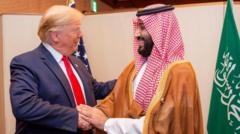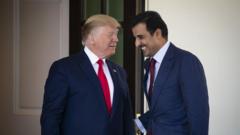As President Trump prepares for his upcoming visit to the Middle East, pivotal shifts in U.S.-Israel relations appear on the horizon. Initially, Trump and Netanyahu's February White House meeting showcased their aligned views, particularly regarding Houthi militants, Iran's nuclear ambitions, and assertive military strategies.
### Turbulence in U.S.-Israel Relations: Growing Divide Between Trump and Netanyahu

### Turbulence in U.S.-Israel Relations: Growing Divide Between Trump and Netanyahu
The evolving relationship between President Trump and Prime Minister Netanyahu raises questions about future Middle East strategies.
Netanyahu lauded Trump’s bold rhetoric in a light-hearted exchange, underscoring a temporary camaraderie that has since frayed. The atmosphere shifted during a subsequent meeting in April, where Netanyahu's muted presence contrasted sharply with Trump’s monologue on unrelated matters, signifying a widening rift.
Ahead of this week's diplomatic trip, Trump's decisions indicate a departure from Netanyahu's approach, particularly in negotiating with Iran rather than endorsing military action against its nuclear capabilities. This divergence is significant, as Netanyahu raises alarms that “a bad deal is worse than no deal,” highlighting concerns about maintaining Israel's security amid fluctuating U.S. priorities.
The contrasting strategies of these two influential leaders may have profound implications for the geopolitics of the Middle East, leaving many to speculate on the durability of their alliance in light of emerging challenges.
Ahead of this week's diplomatic trip, Trump's decisions indicate a departure from Netanyahu's approach, particularly in negotiating with Iran rather than endorsing military action against its nuclear capabilities. This divergence is significant, as Netanyahu raises alarms that “a bad deal is worse than no deal,” highlighting concerns about maintaining Israel's security amid fluctuating U.S. priorities.
The contrasting strategies of these two influential leaders may have profound implications for the geopolitics of the Middle East, leaving many to speculate on the durability of their alliance in light of emerging challenges.



















